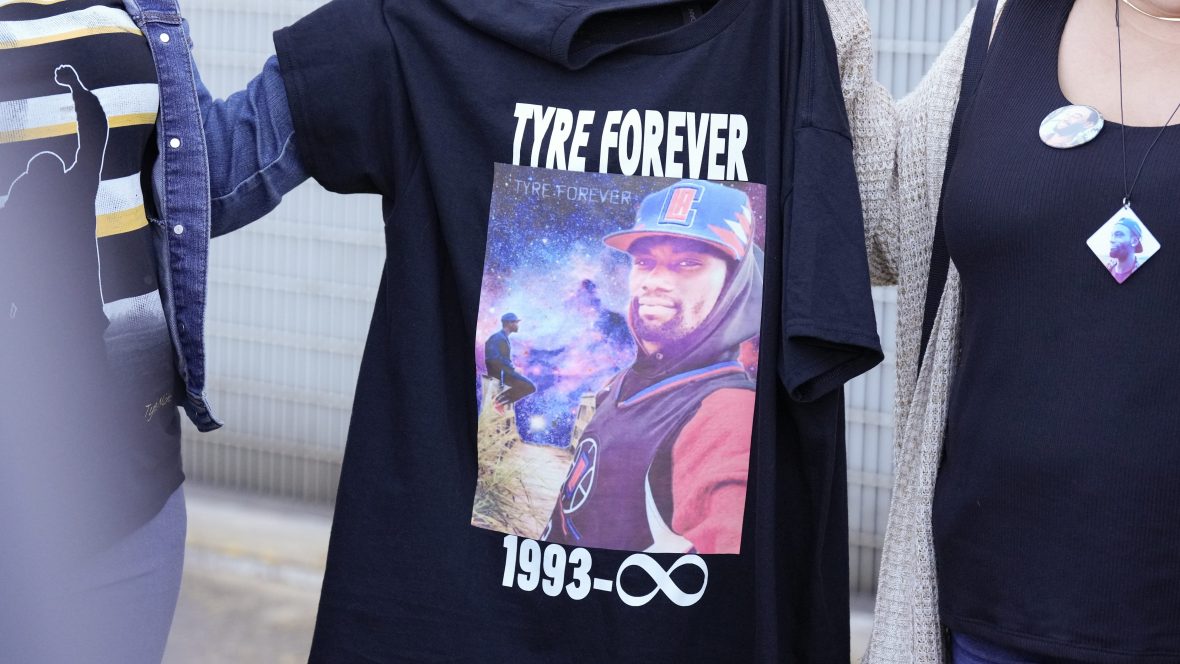Jury deliberating fate of 3 former Memphis officers charged in Tyre Nichols’ fatal beating
Friends and family of Tyre Nichols gather to pray before entering the federal courthouse for the trial of three former Memphis police officers charged in the 2023 fatal beating Nichols, Wednesday, Oct. 2, 2024, in Memphis, Tenn. (AP Photo/George Walker IV)
Jurors began their deliberations Thursday, a day after prosecutors and defense attorneys presented closing arguments in the trial of Tadarrius Bean, Demetrius Haley and Justin Smith.
MEMPHIS, Tenn. (AP) — The future of three former Memphis officers charged with violating Tyre Nichols’ civil rights in a beating that proved fatal is in the hands of a jury after a nearly monthlong federal trial.
Jurors began their deliberations Thursday, a day after prosecutors and defense attorneys presented closing arguments in the trial of Tadarrius Bean, Demetrius Haley and Justin Smith. They were among five officers who were were fired from the Memphis Police Department after the Jan. 7, 2023, beating.
Prosecutor Kathryn Gilbert told jurors that the officers wanted to punish Nichols for running from a traffic stop and that they thought they could get away with it. Prosecutors argued the beating reflected a common police practice referred to in officer slang as the “street tax” or “run tax. ”
“They wanted it to be a beatdown,” Gilbert said. “That’s what it was.”
Defense lawyers sought to downplay each of their clients’ involvement.
Bean’s attorney, John Keith Perry, told jurors that Nichols ignored commands such as “give me your hands” and said his client followed department policies.
“The force was not excessive,” Perry said.
Throughout the monthlong trial, jurors repeatedly watched clips of graphic police video of the beating and traffic stop that preceded it. The video shows officers using pepper spray and a Taser on Nichols, who was Black, before the 29-year-old ran away. The five officers, who also are Black, then punched, kicked and hit him about a block from his home, as he called out for his mother.
As they held Nichols, officers said “hit him” and “beat that man,” prosecutor Forrest Christian said during closing arguments.
“This was not a fight. This was just a beating,” Christian said.
Nichols died three days later. An autopsy report shows Nichols — the father of a boy who is now 7 — died from blows to the head. The report describes brain injuries, and cuts and bruises on his head and elsewhere on his body.
Two of the officers, Emmitt Martin and Desmond Mills Jr., pleaded guilty to depriving Nichols of his civil rights and testified for prosecutors. Haley, Bean and Smith pleaded not guilty to federal charges of excessive force, failure to intervene, and obstructing justice through witness tampering.
Defense lawyers sought to portray Martin as a principal aggressor. Martin testified that Nichols was no threat to officers.
They also suggested without evidence that Nichols may have been on drugs — something Christian called “shameful.” The autopsy report showed only low amounts of alcohol and marijuana in his system.
The five officers were part of the Scorpion Unit, which looked for drugs, illegal guns and violent offenders. It was disbanded after Nichols’ death.
After the beating, the officers did not tell medical professionals on scene or at the hospital that they had punched and kicked Nichols in the head, witnesses said. They also failed tell their supervisor on the scene and write in required forms about the amount of force used, prosecutors argued.
Martin’s testimony provided a glimpse into the Memphis Police Department’s culture, which the U.S. Department of Justice is investigating.
Martin discussed an understanding between members of the Scorpion Unit to not tell on each other after they used excessive force and said they would justify their use of force by exaggerating the person’s actions against them. He also described feeling pressure to make arrests to accumulate “stats” to be able to stay on the street with the unit.
The five officers also have been charged with second-degree murder in state court, where they pleaded not guilty. Mills and Martin are expected to change their pleas. A trial date in state court has not been set.

